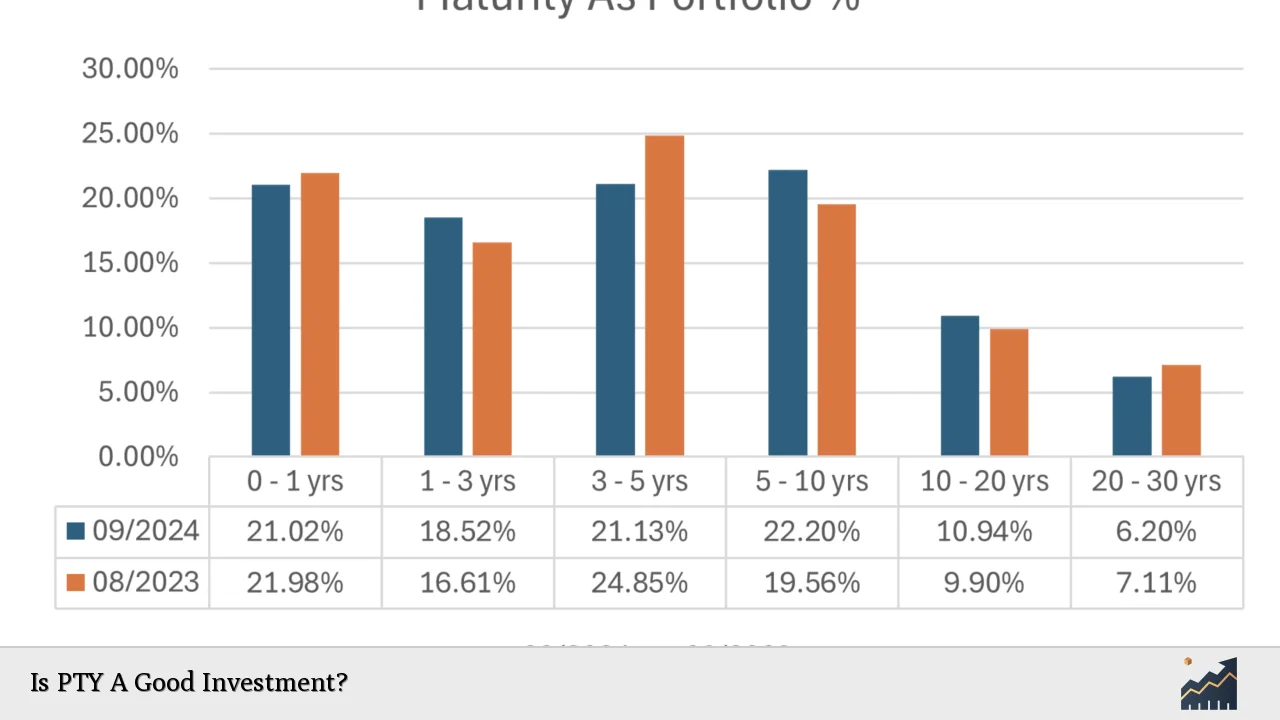The PIMCO Corporate & Income Opportunity Fund (PTY) is a closed-end fund that primarily invests in corporate debt obligations and seeks to provide high current income along with capital appreciation. Managed by PIMCO, a well-respected investment management firm, PTY has garnered attention for its attractive yield and historical performance. However, potential investors must weigh various factors, including market conditions, risks, and the fund’s operational structure, to determine whether PTY aligns with their investment goals.
| Key Concept | Description/Impact |
|---|---|
| Current Yield | As of December 2024, PTY offers a yield of approximately 9.96%, appealing for income-focused investors. |
| Performance History | Over the past two decades, PTY has returned 622% when dividends are reinvested, outperforming the S&P 500’s 539% return during the same period. |
| Expense Ratio | PTY has a relatively low expense ratio compared to peers like PDI, which may enhance net returns for investors. |
| Market Capitalization | The fund has a market capitalization of approximately $1.61 billion, indicating substantial investor interest. |
| Leverage Use | PTY employs leverage to enhance returns, which can amplify both gains and risks depending on market conditions. |
| Interest Rate Sensitivity | The fund’s performance is sensitive to interest rate changes; rising rates can negatively impact bond prices and yields. |
| Volatility and Risk Considerations | While PTY has shown resilience through market downturns, it remains subject to volatility that could affect investor sentiment. |
Market Analysis and Trends
The fixed-income market is currently experiencing a turning point as central banks signal potential interest rate cuts in 2024. This environment could create favorable conditions for bond funds like PTY. Recent data indicates that high-yield bonds have performed well, with gains of approximately 13.5% in 2023—the best year since 2019. Investors are increasingly seeking income-producing assets as they move away from cash due to falling money-market rates.
Current Market Conditions
- Interest Rates: The Federal Reserve’s shift towards rate cuts is expected to boost demand for fixed-income investments.
- Economic Indicators: Recent economic indicators suggest a soft landing rather than a recession, which could support corporate earnings and credit quality.
- Investor Sentiment: With inflation fears receding, investor confidence in corporate bonds is rising, making funds like PTY more attractive.
Implementation Strategies
Investors considering PTY should adopt strategies that align with their financial goals and risk tolerance:
- Long-Term Holding: Given its historical performance and monthly dividends, PTY may be suitable for long-term investors seeking income.
- Diversification: Incorporating PTY into a diversified portfolio can provide exposure to fixed income while balancing equity risks.
- Dollar-Cost Averaging: Regular investments in PTY can mitigate the impact of market volatility over time.
- Tax Considerations: Holding PTY in tax-advantaged accounts (like IRAs) is advisable due to potential tax implications on distributions.
Risk Considerations
While PTY presents attractive opportunities, several risks must be considered:
- Interest Rate Risk: Rising interest rates can lead to declining bond prices. Investors should monitor Federal Reserve policies closely.
- Credit Risk: The fund invests in lower-rated corporate bonds which carry higher default risks compared to investment-grade securities.
- Volatility: Although historically resilient, PTY can experience significant price fluctuations that may not suit all investors.
- Leverage Risks: The use of leverage can enhance returns but also magnifies losses during adverse market conditions.
Regulatory Aspects
PTY operates under regulations governing closed-end funds and managed investment schemes. Key regulatory considerations include:
- Compliance Requirements: The fund must adhere to strict compliance and governance standards set by regulatory bodies such as the SEC.
- Disclosure Obligations: Regular reporting on performance and holdings is mandated to ensure transparency for investors.
- Investor Protections: Regulations are designed to protect retail investors from excessive risk exposure in complex financial products.
Future Outlook
Looking ahead, the outlook for PTY appears cautiously optimistic:
- Yield Opportunities: As interest rates potentially decline, the yield offered by PTY may become increasingly attractive relative to other income-generating assets.
- Market Resilience: Historical performance suggests that PTY can weather economic downturns effectively, making it a viable option during uncertain times.
- Investment Strategy Evolution: PIMCO’s active management approach allows for adjustments based on changing market dynamics, enhancing the fund’s adaptability.
Frequently Asked Questions About Is PTY A Good Investment?
- What is the primary investment objective of PTY?
The primary objective of PTY is to seek high current income while also aiming for capital appreciation. - How does leverage affect PTY’s performance?
Leverage can amplify both returns and risks; while it may enhance income during favorable conditions, it can also lead to greater losses if markets decline. - What are the tax implications of investing in PTY?
Investors should consider holding PTY in tax-advantaged accounts due to potential tax liabilities on distributions in taxable accounts. - Is PTY suitable for conservative investors?
While it offers high yields, its exposure to high-yield bonds and leverage may not align with conservative investment strategies. - How does PTY compare with other fixed-income investments?
PTY generally offers higher yields than traditional government bonds but comes with increased credit risk and volatility. - Can I expect consistent monthly dividends from PTY?
Yes, PTY has a history of providing monthly distributions; however, past performance is not indicative of future results. - What should I watch out for when investing in PTY?
Investors should monitor interest rate trends and economic indicators that could impact bond prices and overall fund performance. - How does market volatility affect my investment in PTY?
Market volatility can lead to price fluctuations in PTY shares; however, long-term holders may benefit from reinvested dividends during downturns.
In conclusion, whether PTY is a good investment depends largely on individual financial goals and risk tolerance. Its attractive yield and historical performance make it appealing for income-focused investors but necessitate careful consideration of associated risks and market conditions.

